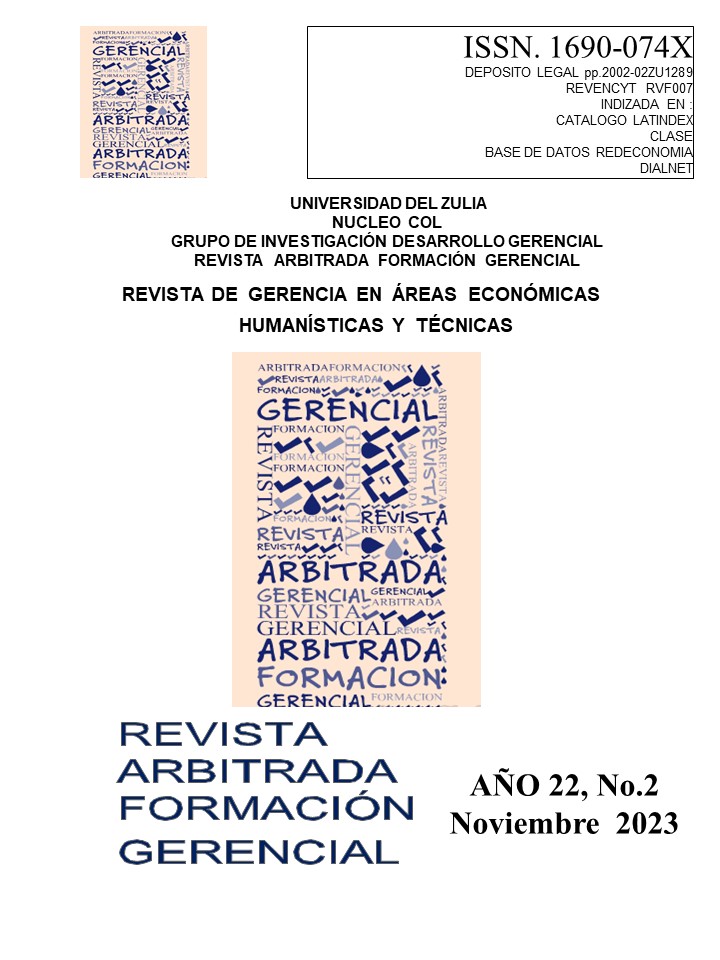EVOLUTION OF SOCIAL RESPONSIBILITY IN ORGANIZATIONS
Abstract
The study was proposed as a purpose to analyze the historical evolution of Social Responsibility in Organizations , based on the theoretical foundation established by the authors Much (2010), Beltrán and Lopez ( 2018), Witzel (2014) Smith (2013) , among others. From the methodological perspective, it is related to documentary research, which involves collecting information, using secondary sources to generate considerations based on the researched topic. Its elaboration implies studying the historical development and how it was formed what Social Responsibility in Organizations represents and its effect on its environment and the community, as well as various theories such as the Instrumental theory, Integrating theories, Political Theories, Theories of Ethics and Morality in Business, among others. The final reflections lead to evidence that in the course of history since the beginning of mankind, human beings have always tried to organize themselves in order to make their businesses more productive, philanthropy of precursors who want to give back to employees, the community and society a welfare that contributes to the welfare of employees, All these aspects contributed to the definition of Social Responsibility, but at the same time it shows that as the world is progressing, its concept will also progress, i.e. not static, in order to meet the expectations and provide a better quality of life..
Downloads
References
Bateman y Snell (2005). Administración: Un nuevo panorama competitivo. México. McGraw-Hill.
Beltran, J. Lopez, J (2018). Evolución de la Administración. Universidad Católica Luis Amigó, Medellin
Carroll, A.B. (1991). “The pyramid of corporate social responsibility: toward the moral management of organizational stakeholders”. Business Horizons, July/August, pp. 39-48.
Carroll, A.B. (1998). “The four faces of corporate citizenship”. Business and Society Review, Vol. 100 No. 1, pp. 1-7.
Carroll, A.B. (1999). ”Corporate social responsibility”. Business and Society. Chicago; Sep 1999. Vol. 38, Iss. 3; p. 268
Castillo, R y Juárez A. (2008). Análisis Organizacional y de Imagen de asociaciones No Lucrativas. (Tesis de grado). España: Universidad de Málaga.
Chiavenato, I. (2009). Comportamiento Organizacional. La dinámica del éxito en las organizaciones (2ª ed.). McGraw-Hill Interamericana Editores, S.A. de C.V. México.
Clark, J. M. (1916). The Changing Basis of Economic Responsibility. Journal of Political Economy, 24(3), 209-229. Recuperado de https://www.jstor.org/stable/1819437?seq=11#metadata_info_tab_contents
Comisión de las Comunidades Europeas (2001). Libro Verde. Fomentar un marco Europeo para la Responsabilidad Social de las Empresas. Bruselas. Belgica.
Davis, K. (1960). "Can business afford to ignore social responsibilities?"; California Management Review, 2, p. 70–76.
Domínguez, R. (2008). ―La Responsabilidad Social Global Empresarial RSGE: el sector privado y la lucha contra la pobreza‖. Revista del Ministerio de Trabajo e Inmigración. 76, 59-93
Fernández, J. (1991). El Proceso administrativo. Editorial DIANA; México.
Fernández, R (2005). Administración de la responsabilidad social Corporativa. Editorial Thompson. Madrid, España.
Fontalvo, T. Bolívar, M. (2010). El sistema de gestión de la responsabilidad social empresarial como una estrategia para la prevención de la contaminación y de los riesgos profesionales. Escenarios • Vol. 8, No. 2, Julio-Diciembre de 2010, Barranquilla. págs. 13.
Freeman, R. E. (1984). Strategic management: A stakeholder approach. Boston: Pitman.
Garriga y Melé (2004). “Corporate Social Responsibility Theories: Mapping the Territory”. Journal of Business Ethics. 53, pp. 52-71.
George, C. y Alvarez, L (2005). Historia del pensamiento Administrativo. Segunda Edición. Pearson Education.
Guedez, V (2006). Ética y Practica de la responsabilidad social empresarial. El aporte de la empresa al capital social. Editorial planeta. Caracas, Venezuela.
Ivancevich, J., Konopaske, R., Matteson M. y Nuñez, J. (2006). Comportamiento organizacional y administración de empresas. Séptima edición. Editorial McGraw-Hill Interamericana de España S.L. Espa
Jones, G y George J. (2010). Administración Contemporánea. Sexta edición. McGraw-Hill. México.
Kaku, R. (2005). Laenda kyosei. Harvard busisness review volumen 83 numero 8 pp. 105-113.
Koontz ,H. O´Donnel, C. (1959). Principles of management. An Analysis o managerial funtions. Segunda Edición. McGraw-Hill. Nueva York.
Koontz ,H. O´Donnel, C. (1987). Elementos de Administración. McGraw Hill. Madrid.
Landreth, H. y Colander, D. (2000). Historia del Pensamiento Económico. Compañía Editorial Continental, Mexico.
Mooney, D,J (1947). The principles of organization. Harper & Bothers, New York, Londo.
Molina, L (2005). De la Responsabilidad Social Empresarial a la Responsabilidad Social Universal. 1er. Concurso Universitario de Responsabilidad Social Empresarial organizado por los Clubes Rotarios de Baruta, El Peñón-Miranda, La Castellana-Miranda, Las Mercedes y Prados del Este. Caracas, Venezuela
Mujica, M. Hernández, A. Villalba, L. Correa, D. Ibañez, N. Castillo, R. (2010). Estudio contextualizado de la administración en Venezuela. Segunda Edición. Rectorado de la Universidad de Carabobo. Valencia.
Munch, L y Galindo, J. (2001). Fundamentos de Administración. Editorial Trillas. Décima Edición. México.
Murray, K. Montanari, J. (1986). Strategic Management of the Socially Responsible Firm: Integrating Management and Marketing Theories. Academy of management review. Volumen 11. Número 4 815-827.
Nagel, T. (2004). La posibilidad del Altruismo. Fondo de Cultura Económica, Mexico.
Porter, M. y Kramel, M. (2002). La ventaja competitiva de la filantropía corporativa Harvard Business Review, ISSN 0717-9952, Vol. 80, Nº. 12, 2002, págs. 49-62 Disponible en: https://dialnet.unirioja.es/servlet/articulo?codigo=1431332.
Reyes P, A. (1992). Administración moderna; Editorial LIMUSA; México,
Sabino, C (2014). El Proceso de la Investigación .10ma Edición, Editorial Episteme.
Guatemala.
Sheldon, O. (1986). La filosofía del management. Barcelona: Orbis.
Taylor, F. W. (1983). Principios de la Administración Científica. Vigésima séptima al español ed. México, D.F.: Herrero Hermanos, Sucs., S.A. México.
Tamayo y Tamayo (2011). El Proceso de la Investigación Científica. 5ta Edición Limusa México
Witzel, .M (2014). Historia del pensamiento Administrativo. Grupo Editorial Patria. México.






